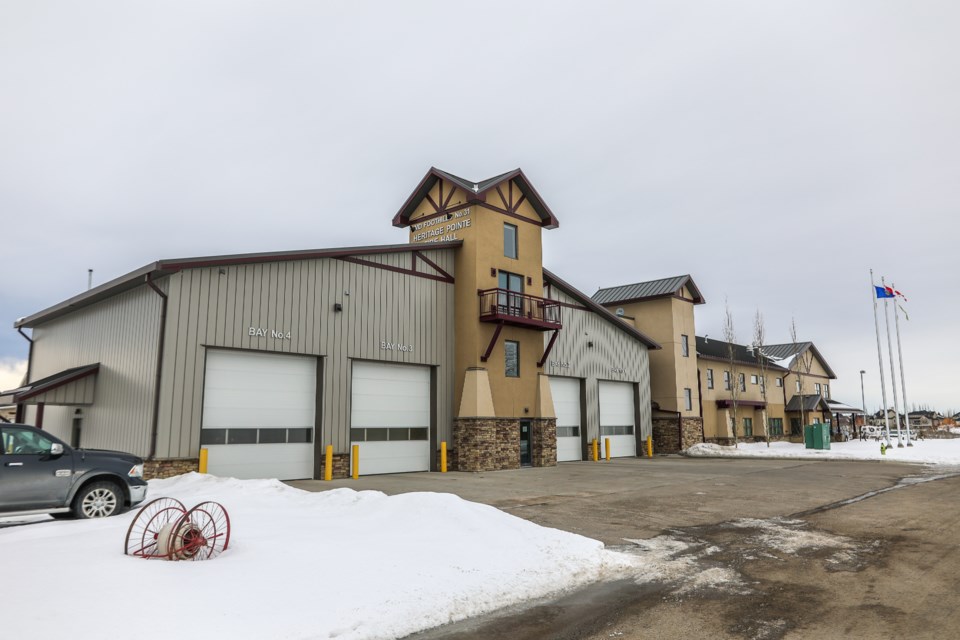A Foothills fire hall is being outfitted with energy-efficient lighting in 2021.
Foothills County council agreed to support a contract to replace the existing fluorescent lights at the Heritage Pointe Fire Hall with LED bulbs, which will consume less energy and result in a reduction in greenhouse gas emissions and cost savings down the road.
“Heritage Pointe Fire Hall is our biggest fire hall, and because of its usage and because of its importance we felt it would make sense to change the lighting to LED,” said Adeniyi Adeaga, Foothills municipal energy manager.
It could take up to about 9.8 years to realize full payback on the cost of replacing the lights should the County pay the full amount without government funding. Council’s policy is to not exceed 10 years for a payback period on its projects, he said.
However, the savings that would be seen from the longer life of LED lights could shorten that period, he said.
“If we factor that in, the pay-back period will be significantly less than 9.8 years, probably in the range of six years or so,” said Adeaga.
The project will be completed as soon as possible, and is one of the low-and medium-cost projects for energy conservation that were identified after the County’s energy audit was completed one year ago.
Adeaga presented a one-year progress report on Foothills County’s energy management efforts to council on Feb. 17, comparing greenhouse gas (GHG) emissions from municipal facilities in 2020 to 2019 levels.
The County had established a goal to reduce emissions by five per cent last year. The goal was exceeded even though the pandemic dictated capital projects could not be tackled, with results based off no-cost measures that were implemented in 2020 such as unplugging the walk-in fridge and freezer units during low-use periods at Scott Seaman Sports Rink in Davisburg as well as reducing the ice plant ammonia refrigerant temperature by one or two degrees, ensuring thermostats in county buildings were operating with “occupied/unoccupied” settings, and encouraging employees working in the office to turn off computers at night and refrain from using items like space heaters.
A total of 3.3 per cent GHG reduction was recorded from utility companies based on those immediate measures. In addition, electricity and natural gas consumption was also reduced by a total of about 16 per cent.
Adeaga cautioned that COVID-19 played a large role in the lower numbers. For starters, Scott Seaman Sports Rink, which accounts for 40 per cent of the municipality’s total GHG was closed for several months during 2020.
With the rink and streetlights removed from the numbers, the total reduction was closer to 10 per cent, he said.
“COVID played a major role in these numbers we’re seeing, but most of the effort we put in place as well, contributed to this drop in our energy consumption,” said Adeaga.
In addition to the Heritage Pointe Fire Hall lighting project, he said there are other capital projects that will be coming before council in the next several weeks, including a potential solar panel installation on a County facility such as Scott Seaman Sports Rink.
That project may be a tougher sell than the LED lights, as councillors questioned whether solar panel recycling programs are in place for safe end-of-life disposal.
“In Canada there is still legislation lacking from government at federal and provincial levels to give direction on how solar panels should be handled at the end of their useful life,” said Adeaga.
He said that’s likely because the panels have only garnered widespread attention in the last couple of decades, particularly in Alberta where the uptake in installation has been in the last 10 years.
In the last two years, the United States set up a program to ship used solar panels back to countries where they are manufactured, such as in Europe, for recycling.
With no Canadian program in place, Coun. Delilah Miller said she’s not convinced solar panels are the way to go.
“Solar is different for me, and until there is a recycling program in place I am a proponent of not moving to solar at this time,” she said.
No decision was made on the solar panels at this time.




